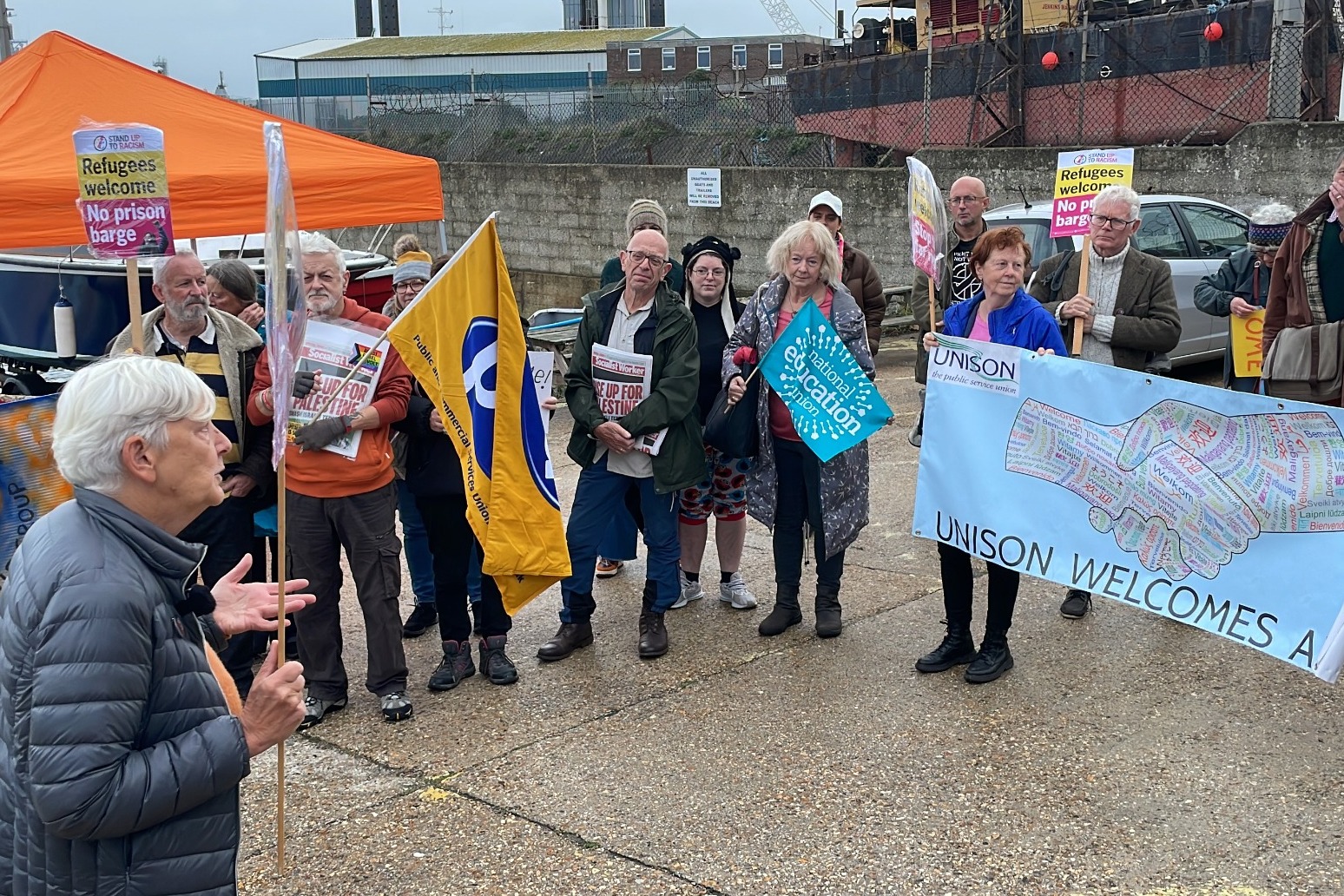
Some migrants are returning to the vessel, following the discovery of Legionella bacteria two months ago
People protesting against the use of the Bibby Stockholm accommodation barge gathered at the gates of Portland Port on Thursday as asylum seekers were brought back on board.
A number of people were being taken on board the vessel at the Dorset port more than two months after it was evacuated following the discovery of Legionella bacteria in the water supply.
A Home Office spokeswoman said that tests for the bacteria, as well as improved fire safety protocols, had been completed ahead of the return of the occupants to the barge.
The Daily Telegraph has reported that of the 39 people removed from the vessel in August, 29 would be returning.
Others had found accommodation with relatives, one had returned to their home country and others had mental health issues exempting them from staying on the barge.
About 30 protesters gathered at the port gates holding banners saying “Scrap the prison barge! Refugees welcome”.
Annika, of Portland Global Friendship Group, had helped produce “welcome bags” for the arrivals which included shampoo, toothpaste, notebooks and a map of the local area.
She said: “We just want to welcome the refugees and make a gesture to show there are people here who care.
“I think the barge is a horrible idea, it feels very oppressive, it feels like a prison here with the amount of security that they have to go through.”
Candy Udwin, of Stand Up To Racism Dorset, said she had been in contact with some of those who had been staying on the Bibby Stockholm.
She said: “They hate it, they say it feels like a prison, some hate being on the sea, they find it very difficult to leave and they are completely separated from the community.”
Local councillor Carralyn Parkes, who is mayor of Portland, and recently lost a High Court fight against Home Secretary Suella Braverman over the lawfulness of housing asylum seekers on the barge also attended the protest.
She said that she was continuing subsequent legal action against Dorset Council as the planning authority responsible for the port.
She said: “The Bibby Stockholm is not the way humane society treats vulnerable human beings.”
The Home Office said it had been working with Dorset and Wiltshire Fire and Rescue Service to address safety concerns, including the creation of a fourth gangway.
All staff members involved in fire evacuation had received accredited fire warden training and would undergo regular drills, a spokeswoman said.
She added that those being brought to the Bibby Stockholm would be given five days’ notice, with each individual being assessed against a suitability criteria and screened against police and immigration databases.
They would also have their fingerprints and identities recorded.
She added that a full system cleanse of the water system had been carried out and tests had given the all-clear for the Legionella bacteria.
The spokeswoman said: “The Government is committed to ending the use of expensive hotels for asylum seekers.
“Moving asylum seekers into alternative accommodation sites, like the Bibby Stockholm, is more affordable for taxpayers and more manageable for communities, with on-site healthcare and catering facilities.”
Steve Smith, chief executive of refugee charity Care4Calais, said it was assisting asylum seekers with legal challenges against the accommodation.
He said: “That includes supporting the survivors of torture and modern slavery to legally challenge their accommodation on these sites, which is contrary to the Government’s own suitability criteria.
“Already, we are seeing some of these transfers being delayed or cancelled altogether because of these challenges.”
Caroline O’Connor, chief executive of Migrant Help, said: “It’s important that people on the barge are able to maintain their independence and are able to come and go, to enter towns, to experience the local culture, to learn about life here.
“It doesn’t help a traumatised person to be isolated from the culture that they’re trying to join.”
Published: by Radio NewsHub









